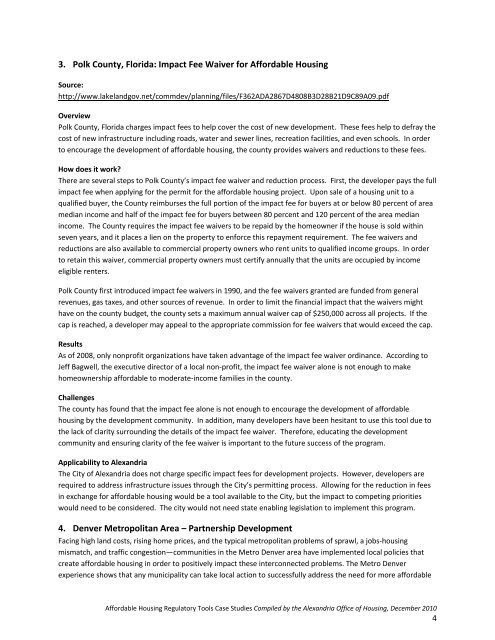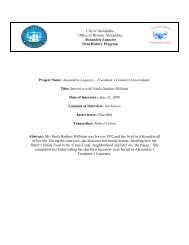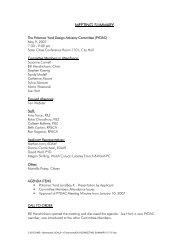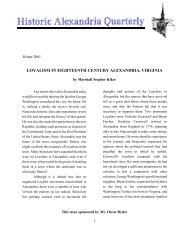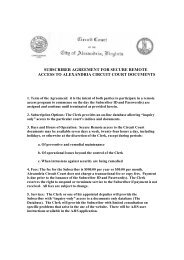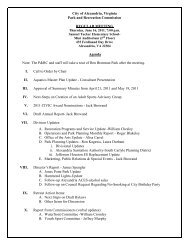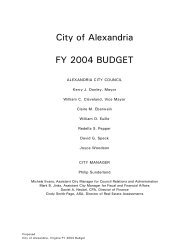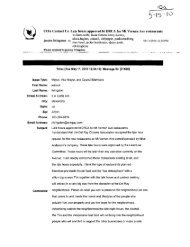Case Studies - Affordable Housing Regulatory ... - City of Alexandria
Case Studies - Affordable Housing Regulatory ... - City of Alexandria
Case Studies - Affordable Housing Regulatory ... - City of Alexandria
Create successful ePaper yourself
Turn your PDF publications into a flip-book with our unique Google optimized e-Paper software.
3. Polk County, Florida: Impact Fee Waiver for <strong>Affordable</strong> <strong>Housing</strong><br />
Source:<br />
http://www.lakelandgov.net/commdev/planning/files/F362ADA2867D4808B3D28B21D9C89A09.pdf<br />
Overview<br />
Polk County, Florida charges impact fees to help cover the cost <strong>of</strong> new development. These fees help to defray the<br />
cost <strong>of</strong> new infrastructure including roads, water and sewer lines, recreation facilities, and even schools. In order<br />
to encourage the development <strong>of</strong> affordable housing, the county provides waivers and reductions to these fees.<br />
How does it work?<br />
There are several steps to Polk County’s impact fee waiver and reduction process. First, the developer pays the full<br />
impact fee when applying for the permit for the affordable housing project. Upon sale <strong>of</strong> a housing unit to a<br />
qualified buyer, the County reimburses the full portion <strong>of</strong> the impact fee for buyers at or below 80 percent <strong>of</strong> area<br />
median income and half <strong>of</strong> the impact fee for buyers between 80 percent and 120 percent <strong>of</strong> the area median<br />
income. The County requires the impact fee waivers to be repaid by the homeowner if the house is sold within<br />
seven years, and it places a lien on the property to enforce this repayment requirement. The fee waivers and<br />
reductions are also available to commercial property owners who rent units to qualified income groups. In order<br />
to retain this waiver, commercial property owners must certify annually that the units are occupied by income<br />
eligible renters.<br />
Polk County first introduced impact fee waivers in 1990, and the fee waivers granted are funded from general<br />
revenues, gas taxes, and other sources <strong>of</strong> revenue. In order to limit the financial impact that the waivers might<br />
have on the county budget, the county sets a maximum annual waiver cap <strong>of</strong> $250,000 across all projects. If the<br />
cap is reached, a developer may appeal to the appropriate commission for fee waivers that would exceed the cap.<br />
Results<br />
As <strong>of</strong> 2008, only nonpr<strong>of</strong>it organizations have taken advantage <strong>of</strong> the impact fee waiver ordinance. According to<br />
Jeff Bagwell, the executive director <strong>of</strong> a local non‐pr<strong>of</strong>it, the impact fee waiver alone is not enough to make<br />
homeownership affordable to moderate‐income families in the county.<br />
Challenges<br />
The county has found that the impact fee alone is not enough to encourage the development <strong>of</strong> affordable<br />
housing by the development community. In addition, many developers have been hesitant to use this tool due to<br />
the lack <strong>of</strong> clarity surrounding the details <strong>of</strong> the impact fee waiver. Therefore, educating the development<br />
community and ensuring clarity <strong>of</strong> the fee waiver is important to the future success <strong>of</strong> the program.<br />
Applicability to <strong>Alexandria</strong><br />
The <strong>City</strong> <strong>of</strong> <strong>Alexandria</strong> does not charge specific impact fees for development projects. However, developers are<br />
required to address infrastructure issues through the <strong>City</strong>’s permitting process. Allowing for the reduction in fees<br />
in exchange for affordable housing would be a tool available to the <strong>City</strong>, but the impact to competing priorities<br />
would need to be considered. The city would not need state enabling legislation to implement this program.<br />
4. Denver Metropolitan Area – Partnership Development<br />
Facing high land costs, rising home prices, and the typical metropolitan problems <strong>of</strong> sprawl, a jobs‐housing<br />
mismatch, and traffic congestion—communities in the Metro Denver area have implemented local policies that<br />
create affordable housing in order to positively impact these interconnected problems. The Metro Denver<br />
experience shows that any municipality can take local action to successfully address the need for more affordable<br />
<strong>Affordable</strong> <strong>Housing</strong> <strong>Regulatory</strong> Tools <strong>Case</strong> <strong>Studies</strong> Compiled by the <strong>Alexandria</strong> Office <strong>of</strong> <strong>Housing</strong>, December 2010<br />
4


